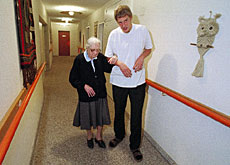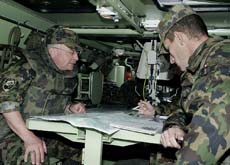Leuthard praises work of civilian service

Economics Minister Doris Leuthard has described ten years of civilian service in Switzerland as a "win-win story".
Speaking in Bern on Friday at a ceremony to mark the occasion, Leuthard praised the achievements of those people who do social work rather than carry out compulsory military service.
Civilian service was introduced a decade ago for those who have moral objections to military service.
She said the service, which can include work in care homes and hospitals or in environmental and aid projects, was an important means to fill gaps in Swiss society and encouraged solidarity and public spirit.
“Civilian service is something that makes sense. It is something that wins over young people,” she said.
Leuthard noted that the service was not only a benefit to those involved but also to employers because people doing such duties brought back new skills to the workplace.
“Civilian service creates win-win situations for everybody.”
Development
She also put forward possibilities for development of the system, including an improvement in basic training and the setting up of partnerships in environment projects.
Leuthard said that the procedure for applying for civilian service should be reviewed but she was against abolishing it altogether.
“It certainly doesn’t harm the personal development of a young person to have to think about himself, his moral attitudes and his relationship to the state.”
There have been calls from various sides recently to do away with the process, which includes a hearing where the applicant is asked to give reasons for refusing to do military service.
Leuthard said the law on civilian service had freed the army and military justice system of the problem of treating those who refused to do military service as criminals.
Civilian service was accepted and those people who carried it out were not considered shirkers, she said.
Last month, the Swiss Committee for Civilian Service said the number of people enrolled was falling, a trend that threatened its existence.
It proposed a series of reforms, including admitting women and foreigners, to try to stop the trend.
swissinfo with agencies
Civilian service is carried out over 390 days, one and a half times longer than military service.
A person, normally a young man under Switzerland’s conscription system, doing civilian service works in public institutions or those recognised as being useful to the public in the health, social, environmental, humanitarian aid or development fields (including abroad).
During service, he receives 80% of his salary, like soldiers, and a SFr5 per day pay allowance.
Over the past ten years, about 15,000 young Swiss have carried out such duties, which amounts to a total of more than two million days of service.
The law on civilian service came into force in Switzerland on October 1, 1996.
Civilian service is not considered a free choice. It is interpreted as a particular form of fulfilling military obligation.
A person wishing to do civilian service must be declared fit to do military service before he can make a request.
He has to go before a committee that decides on the credibility of his motives.

In compliance with the JTI standards
More: SWI swissinfo.ch certified by the Journalism Trust Initiative

You can find an overview of ongoing debates with our journalists here. Please join us!
If you want to start a conversation about a topic raised in this article or want to report factual errors, email us at english@swissinfo.ch.